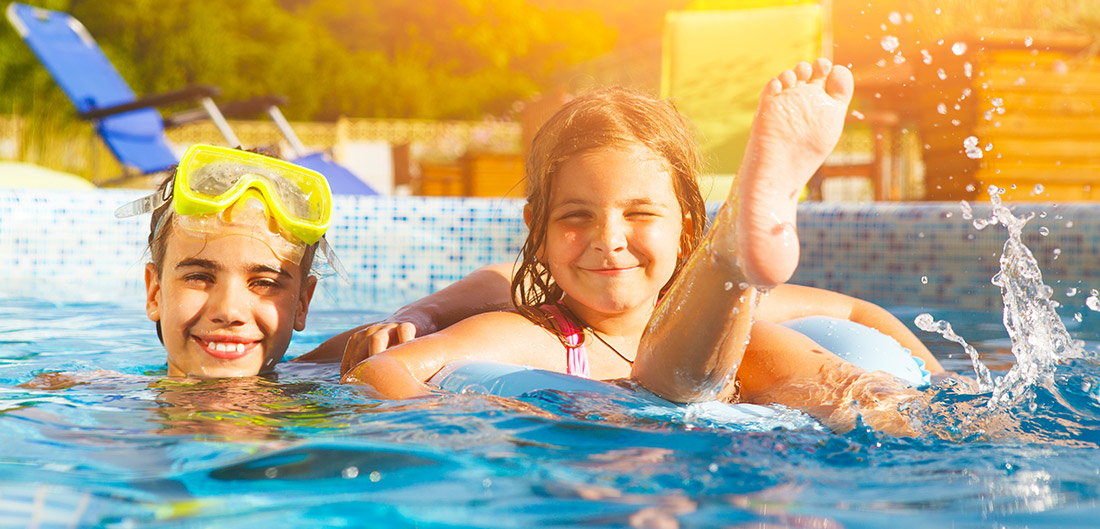 By Erie Insurance
By Erie Insurance
It doesn’t get much better than having a swimming pool in the summer. But as great as lounging in the pool is, it doesn’t come without its responsibilities.
Most would agree the greatest responsibility pool owners have is keeping children safe when they go swimming. The Centers for Disease Control and Prevention report that children ages 1 through 4 are the ones who have the greatest risk of drowning. In most of these cases, the children slipped into the pool without anyone noticing them.
That’s not the only danger at the pool, however. Older children and even adults can be hurt as well, not only by drowning, but also by slipping and falling on wet surfaces. Here are some safety measures you can take to help prevent these potential tragedies from happening:
- Install a fence with a lockable gate around the pool that’s at least 4-feet tall.
- When no one is using the pool, remove all accessories (including ladders, toys, flotation devices, etc.), and put a hard cover over the pool. The cover will prevent children from falling into the pool, as well as keep debris out.
- Make sure a responsible adult is always watching children while they are in the pool. Never leave them unsupervised.
- Provide life vests or floaties to adults or children that cannot swim.
- Establish swimming safety rules, make a sign with the rules compiled on it, and place it somewhere near the pool so everyone can see it. Enforce those rules at all times, whether you’re dealing with your immediate family members or guests.
- Make sure everyone in the house has taken first aid and CPR classes.
- Invest in a motion-activated alarm that goes off when someone unexpectantly enters the pool. This is particularly useful if you’re inside the house.
- If you have young children, install a back door alarm so you’ll be alerted if they slip out without you noticing.
- If alcohol is a factor in half of all swimming pool drowning deaths for teenagers and adults. Therefore, it may be a good idea to limit the amount of alcohol intake for everyone when you’re hanging around your pool.
According to the CDC guidelines, if you will be spending time in or around water on your next trip, follow these tips to stay safe. These are very important to know:
Prepare for Water Activities
Before your trip and before you participate in water-related activities at your destination, take the following steps:
- Research local water conditions, currents, and rules.
- Ask about local sea animals, such as urchins, jellyfish, coral, and sea lice. A sting from a sea creature can spoil your trip with severe pain and the need for immediate first aid, and in rare cases can be fatal.
- Follow any guidance from local instructors and officials before boating, scuba diving, or participating in water-related activities.
Take Steps to Protect Yourself and Your Travel Companions
Follow these steps to protect yourself and others from water-related injuries and drowning:
- Wear a life jacket on boats or whenever you participate in water recreation activities.
- Never swim alone in unfamiliar waters. Even if you are a strong swimmer, rip currents or other circumstances beyond your control can occur.
- Do NOT drink alcohol before or during swimming, diving, or boating.
- Alcohol affects balance, coordination, and judgment.
- Aldcohol use is involved in 3 out of 4 adolescent and adult deaths associated with water recreation.
- Do NOT dive in shallow water. Always enter the water using your feet first.
- Look for obstacles (like rocks or fallen trees) in the water that could cause injury.
- Supervise children closely around water. Drowning is a leading cause of death for children ages 1 to 14 years.
Scuba Diving
- Make sure your gear, such as scuba masks and tanks, is properly fitted and maintained.
- Understand the risks and potential injuries that may arise during or after diving, such as decompression sickness (DCS).
- DCS, also called “the bends,” occurs when moving too quickly from an area of high pressure (deep under water) to low pressure. DCS can obstruct blood flow or oxygen to the tissues, which can be very painful and sometimes fatal.
- To prevent DCS, avoid flying for more than
- 24–48 hours after a dive that required decompression stops (pauses in your ascent)
- 12 hours after surfacing from a single no-decompression dive (without having to pause during your ascent)
- 18 hours after repetitive dives or multiple days of diving.
Please feel free to contact our professionals at Assure America to find out about insuring your home if you have a pool or if you recently had a pool installed. We have locations in: Weirton, Wellsburg and Chester in West Virginia; Steubenville, Ohio; Louisville, Kentucky; and Pittsburgh, Pennsylvania.
Updated on July 15, 2022



Post Your Comment